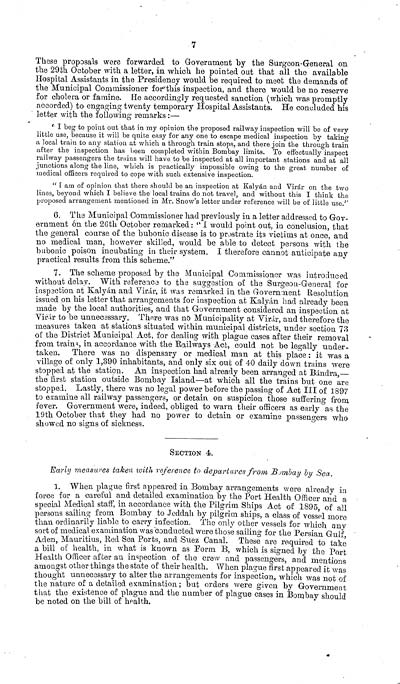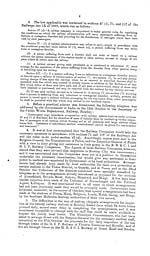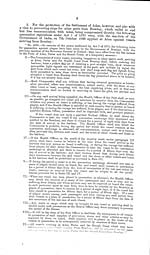Medicine - Disease > Account of plague administration in the Bombay Presidency from September 1896 till May 1897
(19) Page 7
Download files
Individual page:
Thumbnail gallery: Grid view | List view

7
These proposals were forwarded to Government by the Surgeon-General on
the 29th October with a letter, in which he pointed out that all the available
Hospital Assistants in the Presidency would be required to meet the demands of
the Municipal Commissioner for this inspection, and there would be no reserve
for cholera or famine. He accordingly requested sanction (which was promptly
accorded) to engaging twenty temporary Hospital Assistants. He concluded his
letter with the following remarks:-
"I beg to point out that in my opinion the proposed railway inspection will be of very
little use, because it will be quite easy for any one to escape medical inspection by taking
a local train to any station at which a through train stops, and there join the through train
after the inspection has been completed within Bombay limits. To effectually inspect
railway passengers the trains will have to be inspected at all important stations and at all
junctions along the line, which is practically impossible owing to the great number of
medical officers required to cope with such extensive inspection.
" I am of opinion that there should be an inspection at Kalyn and Virr on the two
lines, beyond which I believe the local trains do not travel, and without this I think the
proposed arrangement mentioned in Mr. Snow's letter under reference will be of little use."
6. The Municipal Commissioner had previously in a letter addressed to Gov-
ernment on the 26th October remarked: " I would point out, in conclusion, that
the general course of the bubonic disease is to prostrate its victims at once, and
no medical man, however skilled, would be able to detect persons with the
bubonic poison incubating in their system. I therefore cannot anticipate any
practical results from this scheme."
7. The scheme proposed by the Municipal Commissioner was introduced
without delay. With reference to the suggestion of the Surgeon-General for
inspection at Kalyn and Virr, it was remarked in the Government Resolution
issued on his letter that arrangements for inspection at Kalyn had already been
made by the local authorities, and that Government considered an inspection at
Virr to be unnecessary. There was no Municipality at Virr, and therefore the
measures taken at stations situated within municipal districts, under section 73
of the District Municipal Act, for dealing with plague cases after their removal
from trains, in accordance with the Railways Act, could not be legally under-
taken. There was no dispensary or medical man at this place: it was a
village of only 1,390 inhabitants, and only six out of 40 daily down trains were
stopped at the station. An inspection had already been arranged at Bndra,-
the first station outside Bombay Island-at which all the trains but one are
stopped. Lastly, there was no legal power before the passing of Act III of 1897
to examine all railway passengers, or detain on suspicion those suffering from
fever. Government were, indeed, obliged to warn their officers as early as the
19th October that they had no power to detain or examine passengers who
showed no signs of sickness.
SECTION 4.
Early measures taken with reference to departures from Bombay by Sea.
1. When plague first appeared in Bombay arrangements were already in
force for a careful and detailed examination by the Port Health Officer and a
special Medical staff, in accordance with the Pilgrim Ships Act of 1895, of all
persons sailing from Bombay to Jeddah by pilgrim ships, a class of vessel more
than ordinarily liable to carry infection. The only other vessels for which any
sort of medical examination was conducted were those sailing for the Persian Gulf,
Aden, Mauritius, Red Sea Ports, and Suez Canal. These are required to take
a bill of health, in what is known as Form B, which is signed by the Port
Health Officer after an inspection of the crew and passengers, and mentions
amongst other things the state of their health. When plague first appeared it was
thought unnecessary to alter the arrangements for inspection, which was not of
the nature of a detailed examination; but orders were given by Government
that the existence of plague and the number of plague cases in Bombay should
be noted on the bill of health.
These proposals were forwarded to Government by the Surgeon-General on
the 29th October with a letter, in which he pointed out that all the available
Hospital Assistants in the Presidency would be required to meet the demands of
the Municipal Commissioner for this inspection, and there would be no reserve
for cholera or famine. He accordingly requested sanction (which was promptly
accorded) to engaging twenty temporary Hospital Assistants. He concluded his
letter with the following remarks:-
"I beg to point out that in my opinion the proposed railway inspection will be of very
little use, because it will be quite easy for any one to escape medical inspection by taking
a local train to any station at which a through train stops, and there join the through train
after the inspection has been completed within Bombay limits. To effectually inspect
railway passengers the trains will have to be inspected at all important stations and at all
junctions along the line, which is practically impossible owing to the great number of
medical officers required to cope with such extensive inspection.
" I am of opinion that there should be an inspection at Kalyn and Virr on the two
lines, beyond which I believe the local trains do not travel, and without this I think the
proposed arrangement mentioned in Mr. Snow's letter under reference will be of little use."
6. The Municipal Commissioner had previously in a letter addressed to Gov-
ernment on the 26th October remarked: " I would point out, in conclusion, that
the general course of the bubonic disease is to prostrate its victims at once, and
no medical man, however skilled, would be able to detect persons with the
bubonic poison incubating in their system. I therefore cannot anticipate any
practical results from this scheme."
7. The scheme proposed by the Municipal Commissioner was introduced
without delay. With reference to the suggestion of the Surgeon-General for
inspection at Kalyn and Virr, it was remarked in the Government Resolution
issued on his letter that arrangements for inspection at Kalyn had already been
made by the local authorities, and that Government considered an inspection at
Virr to be unnecessary. There was no Municipality at Virr, and therefore the
measures taken at stations situated within municipal districts, under section 73
of the District Municipal Act, for dealing with plague cases after their removal
from trains, in accordance with the Railways Act, could not be legally under-
taken. There was no dispensary or medical man at this place: it was a
village of only 1,390 inhabitants, and only six out of 40 daily down trains were
stopped at the station. An inspection had already been arranged at Bndra,-
the first station outside Bombay Island-at which all the trains but one are
stopped. Lastly, there was no legal power before the passing of Act III of 1897
to examine all railway passengers, or detain on suspicion those suffering from
fever. Government were, indeed, obliged to warn their officers as early as the
19th October that they had no power to detain or examine passengers who
showed no signs of sickness.
SECTION 4.
Early measures taken with reference to departures from Bombay by Sea.
1. When plague first appeared in Bombay arrangements were already in
force for a careful and detailed examination by the Port Health Officer and a
special Medical staff, in accordance with the Pilgrim Ships Act of 1895, of all
persons sailing from Bombay to Jeddah by pilgrim ships, a class of vessel more
than ordinarily liable to carry infection. The only other vessels for which any
sort of medical examination was conducted were those sailing for the Persian Gulf,
Aden, Mauritius, Red Sea Ports, and Suez Canal. These are required to take
a bill of health, in what is known as Form B, which is signed by the Port
Health Officer after an inspection of the crew and passengers, and mentions
amongst other things the state of their health. When plague first appeared it was
thought unnecessary to alter the arrangements for inspection, which was not of
the nature of a detailed examination; but orders were given by Government
that the existence of plague and the number of plague cases in Bombay should
be noted on the bill of health.
Set display mode to: Large image | Zoom image | Transcription
Images and transcriptions on this page, including medium image downloads, may be used under the Creative Commons Attribution 4.0 International Licence unless otherwise stated. ![]()
| India Papers > Medicine - Disease > Account of plague administration in the Bombay Presidency from September 1896 till May 1897 > (19) Page 7 |
|---|
| Permanent URL | https://digital.nls.uk/74517048 |
|---|




